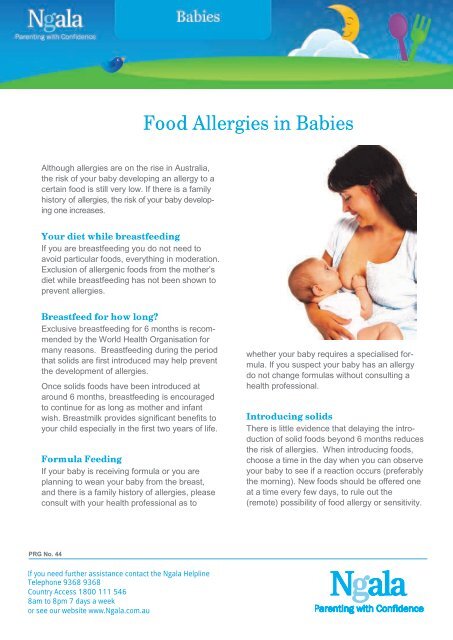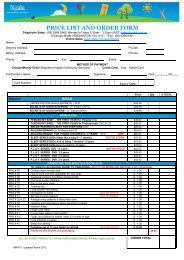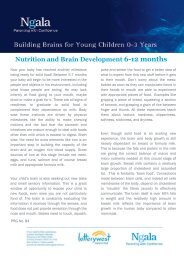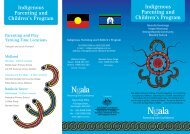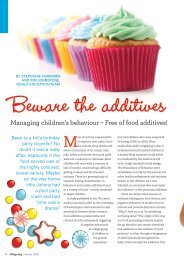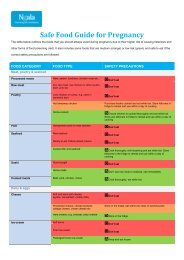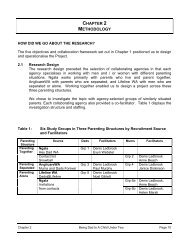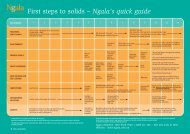Food Allergies in Babies - Ngala
Food Allergies in Babies - Ngala
Food Allergies in Babies - Ngala
You also want an ePaper? Increase the reach of your titles
YUMPU automatically turns print PDFs into web optimized ePapers that Google loves.
<strong>Food</strong> <strong>Allergies</strong> <strong>in</strong> <strong>Babies</strong><br />
Although allergies are on the rise <strong>in</strong> Australia,<br />
the risk of your baby develop<strong>in</strong>g an allergy to a<br />
certa<strong>in</strong> food is still very low. If there is a family<br />
history of allergies, the risk of your baby develop<strong>in</strong>g<br />
one <strong>in</strong>creases.<br />
Your diet while breastfeed<strong>in</strong>g<br />
If you are breastfeed<strong>in</strong>g you do not need to<br />
avoid particular foods, everyth<strong>in</strong>g <strong>in</strong> moderation.<br />
Exclusion of allergenic foods from the mother’s<br />
diet while breastfeed<strong>in</strong>g has not been shown to<br />
prevent allergies.<br />
Breastfeed for how long<br />
Exclusive breastfeed<strong>in</strong>g for 6 months is recommended<br />
by the World Health Organisation for<br />
many reasons. Breastfeed<strong>in</strong>g dur<strong>in</strong>g the period<br />
that solids are first <strong>in</strong>troduced may help prevent<br />
the development of allergies.<br />
Once solids foods have been <strong>in</strong>troduced at<br />
around 6 months, breastfeed<strong>in</strong>g is encouraged<br />
to cont<strong>in</strong>ue for as long as mother and <strong>in</strong>fant<br />
wish. Breastmilk provides significant benefits to<br />
your child especially <strong>in</strong> the first two years of life.<br />
Formula Feed<strong>in</strong>g<br />
If your baby is receiv<strong>in</strong>g formula or you are<br />
plann<strong>in</strong>g to wean your baby from the breast,<br />
and there is a family history of allergies, please<br />
consult with your health professional as to<br />
whether your baby requires a specialised formula.<br />
If you suspect your baby has an allergy<br />
do not change formulas without consult<strong>in</strong>g a<br />
health professional.<br />
Introduc<strong>in</strong>g solids<br />
There is little evidence that delay<strong>in</strong>g the <strong>in</strong>troduction<br />
of solid foods beyond 6 months reduces<br />
the risk of allergies. When <strong>in</strong>troduc<strong>in</strong>g foods,<br />
choose a time <strong>in</strong> the day when you can observe<br />
your baby to see if a reaction occurs (preferably<br />
the morn<strong>in</strong>g). New foods should be offered one<br />
at a time every few days, to rule out the<br />
(remote) possibility of food allergy or sensitivity.<br />
PRG No. 44<br />
If you need further assistance contact the <strong>Ngala</strong> Helpl<strong>in</strong>e<br />
Telephone 9368 9368<br />
Country Access 1800 111 546<br />
8am to 8pm 7 days a week<br />
or see our website www.<strong>Ngala</strong>.com.au
The most common foods that babies may have<br />
a reaction to are:<br />
Cow’s milk and milk products (full cream<br />
cow’s milk should not be given to your baby<br />
as a dr<strong>in</strong>k until after 12 months of age)<br />
Egg (especially egg white)<br />
<strong>Food</strong>s with peanut or tree nut products <strong>in</strong>.<br />
Seeds e.g. sesame seeds<br />
Seafood/fish<br />
Soy products<br />
Wheat such as bread, some breakfast<br />
cereals and pasta<br />
Symptoms of <strong>Food</strong> Sensitivity<br />
Watery bowel actions (poos)<br />
Vomit<strong>in</strong>g<br />
Rashes (on the chest or bottom)<br />
Swell<strong>in</strong>g around the lips and mouth<br />
or <strong>in</strong> the throat<br />
Wheez<strong>in</strong>g when breath<strong>in</strong>g<br />
Most children grow out of food allergies before<br />
they start school.<br />
If you suspect that your baby might have a<br />
food allergy, contact your Child Health<br />
Nurse or GP to discuss it.<br />
It is best not to restrict your baby’s food<br />
choices until they have been tested for a<br />
food allergy by a specialised health<br />
professional.<br />
PRG No. 44<br />
Websites for more <strong>in</strong>formation:<br />
www.allergy.org.au<br />
www.health<strong>in</strong>site.gov.au/topics/<strong>Food</strong>_<strong>Allergies</strong><br />
If you need further assistance contact the <strong>Ngala</strong> Helpl<strong>in</strong>e<br />
Telephone 9368 9368<br />
Country Access 1800 111 546<br />
8am to 8pm 7 days a week<br />
or see our website www.<strong>Ngala</strong>.com.au


